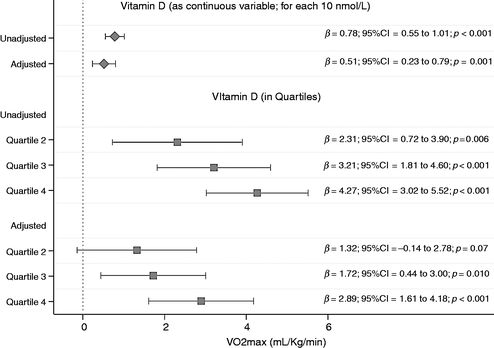|
More vitamin D in your blood means more cardiorespiratory fitness
The more vitamin D circulates in your body, the fitter you are. Researchers from Virginia Commonwealth University report this in the European Journal of Preventive Cardiology. Compared with lower vitamin D levels, optimal vitamin D levels may make muscle cells absorb more oxygen for oxidation processes.
Study
The researchers used data from 1995 people, aged 20-49, who had participated in the National Health and Nutrition Survey. The participants' maximal oxygen uptake [VO2max] had been determined during an exercise test. The VO2max is the most important factor in human fitness.
The researchers had removed study participants with an extremely high or extremely low vitamin D level from their dataset.
Results
The more vitamin D the study participants had in their blood, the higher their VO2max. This association remained intact when the researchers corrected their figures for other factors, such as body weight and hemoglobin.
An increase of the vitamin D level with 10 nanomoles per liter - after brushing away the effect other variables - resulted in an increase of the VO2max by half a point.


Explanation
"Vitamin D may affect myocytes by increasing muscle protein synthesis and calcium and phosphorus transport in energy production", write the researchers. "In addition, vitamin D may increase the relative number of one type of fast-twitch muscle fibers [IIa] and decrease another type of fast-twitch muscle fibers [IIb], suggesting that vitamin D may improve aerobic fitness."
"In addition to its effect on muscles, animal studies suggest that vitamin D may have a role in heart structure and function. Mitochondria from chick cardiomyocytes produced less energy when vitamin D levels were low. In another study, vitamin D deficiency in rodents was associated with decreased myocardial contractility and cardiac output and increased heart rate, changes commonly seen in failing hearts."
"Vitamin D deficiency has been reported to be associated with decreased myofibrillar area and the increased deposition of myocardial collagen in the extracellular space."
Conclusion
"We found a strong independent association between vitamin D levels and cardiorespiratory fitness, which was robust to potential confounding variables", summarize the researchers. "Future studies are needed to explore the underlying biological mechanisms of the observed association. Clinical trials of vitamin D supplementation are required to validate the relationship."
Source:
Eur J Prev Cardiol. 2018 Oct 30:2047487318807279. doi: 10.1177/2047487318807279. [Epub ahead of print].
More:
Vitamin D3 supplementation makes soccer training more effective 14.04.2018
Two weeks of extra vitamin D: fitter, less quickly tired, lower blood pressure and less cortisol 07.01.2017
Fit centenarians have high vitamin D levels 22.11.2016
Archives:
Endurance Supplements
Vitamin D
Vitamins
|






